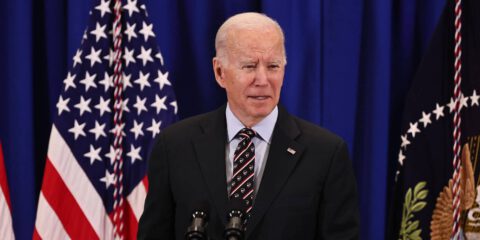ארה”ב יכולה לשקם את מעמדה כמעצמת-על על ידי הוכחת נחישותה להשתמש בכוח צבאי להשגת האינטרסים הלאומיים שלה.
בתחילת יולי הודיע הנשיא ביידן לעם האמריקני על הנסיגה הקרובה של כוחות ארה”ב מאפגניסטן לאחר מעורבות צבאית של 20 שנה, ואותת על תוכניתו להוריד את הפרופיל של אמריקה במזרח התיכון. הנסיגה בפועל הייתה תקלה צבאית ופוליטית. באופן דומה, ביולי חתם הנשיא ביידן על הסכם לסיום ההשתתפות של ארה”ב במשימות קרביות בעיראק עד סוף השנה, כאשר החיילים הנותרים יעסקו באימון הצבא העיראקי ובייעוץ. ובעניין הגרעין של איראן, ממשל ביידן נראה להוט להסיר את הנושא מסדר היום של מדיניות החוץ שלו, אפילו במחיר של ויתורים שישאירו את איראן קרובה ליכולת פריצה גרעינית.
נראה כי החלטות מדיניות החוץ האלו משתלבות במגמה ארוכת טווח לצמצום מעורבות ארה”ב במזרח התיכון. מגמה זו החלה בתקופת כהונתו של הנשיא אובמה, ושיקפה את העייפות מהמעורבות הצבאית בעקבות שתי מלחמות לא מוצלחות (עיראק ואפגניסטן). גם הדחפים הבדלניים הקיימים כיום בחלק גדול מהציבור האמריקאי תומכים במגמה להורדת הפרופיל הצבאי של אמריקה בחו”ל. כמו כן, התלות הפוחתת של ארה”ב במזרח התיכון העשיר בנפט מקילה על ההתנתקות מאזור זה. לבסוף, תשומת הלב הגדולה יותר של ארה”ב לאתגרים שמציבה סין מחייבת שינוי של סדרי העדיפויות והיערכות צבאית ברחבי העולם.
לנסיגת הכוחות האמריקאים מהמזרח התיכון עשויים להיות יתרונות אסטרטגיים. נראה שהרציונל לצמצום הפריסה הצבאית בעולם תואם את מה שאסטרטגים אמריקאים כינו Offshore Balancing, כלומר ארה”ב מחזיקה בפחות בסיסים מעבר לים, אך שומרת על יכולתה להקרין עוצמה צבאית לאזורים מרוחקים בעת הצורך. בדרך זו יהיו הכוחות האמריקאים פחות פגיעים לגחמות ולפרובוקציות של שחקנים אזוריים, וישתמשו בצבאם רק אם אינטרסים אמריקאים חיוניים יעמדו על כף המאזניים.
לרוע המזל, המהלכים של ארה”ב במזרח התיכון אינם נתפסים בעיני כולם כשינוי אסטרטגיה במטרה לשמור על מעמדה של ארה”ב כמעצמת-על. התפיסה הרווחת היא שארה”ב מוחלשת, עסוקה בנושאים פנימיים, ואינה מוכנה להנהיג את העולם החופשי. כמה מבעלי בריתה של אמריקה מפקפקים באמינותה. מנהיגים רבים תופסים את אמריקה כנסוגה מתפקידה כשוטר עולמי.
הערכות כאלה היו קיימות בעבר, אבל ארה”ב שמרה על מעמדה כמעצמת-על. אחת המטרות העיקריות של ביידן כוללת החזרת מנהיגות אמריקאית בחו”ל. האתגר הזה נראה גדול מתמיד.
ואכן, אנו רואים סין יותר ויותר תוקפנית. סין הרחיבה את אחיזתה בים סין הדרומי, למרות פסיקה של בית המשפט הבינלאומי בהאג בשנת 2016 שקבעה כי פעילותה של סין בתוך אזור הים של הפיליפינים מהווה פגיעה בריבונות המדינה. יתרה מכך, סין הסלימה לאחרונה את הרטוריקה והפעולות שלה בנוגע לטאיוואן.
רוסיה מצידה פלשה לחצי האי קרים, מרכזת כוחות לאורך גבול אוקראינה ומנהלת מלחמה בעצימות נמוכה בחלק המזרחי של המדינה. בנוסף, רוסיה שלחה את חיל האוויר שלה לסייע למשטרו של נשיא סוריה בשאר אל-אסד, ושכירי החרב שלה פועלים במדינות מספר.
אפילו מעצמות קטנות יותר, בעלות ברית או אויבות של ארה”ב, פועלות מתוך התחשבות מועטה בהעדפותיה של וושינגטון. טורקיה התערבה צבאית בסוריה, בעיראק, בלוב ובאזרבייג’ן; פקיסטן מפלרטטת עם רדיקלים אסלאמיסטים באפגניסטן; קובה וונצואלה הן מעוזים פעילים של אנטי-אמריקאיות; לאיראן יש שלוחים חמושים המבקשים להשתלט על המזרח התיכון, ואף תוקפת מטרות אמריקאיות ללא עונש.
אימוץ אסטרטגיית Offshore Balancing, התואמת מעמד של מעצמת-על, דורש כוח צבאי המסוגל להגיע במהירות לכל מקום בעולם. יתרה מכך, נדרשת מנהיגות אמריקאית שמשדרת אמינות בנוגע לשימוש בכוח – במידת הצורך – בעולם ההובסיאני שאנו חיים בו.
דו”ח של הפנטגון מספטמבר הדגיש את המודרניזציה וההתחזקות המרשימים של הצבא הסיני. ארה”ב נחותה ממנה בכמה קטגוריות נשק, כמו טילים בליסטיים (GLBMs) וטילי שיוט (GLCMs). סין ניסתה באוגוסט טיל שנע במהירות הגבוהה פי חמישה ממהירות הקול (היפרסוני) ובעל יכולת גרעינית, והציגה יכולת שככל הנראה הפתיעה את המודיעין האמריקני.
בניין הכוח הדרוש לשמירה על יתרון באסיה ייקח זמן וידרוש מימון גדול יותר. גם אם החשש מכרסום בעליונות הצבאית של ארה”ב מוגזם, נחישותה של אמריקה לפעול נותרה בסימן שאלה.
ארה”ב יכולה לשקם את מעמדה כמעצמת-על על ידי הוכחת נחישותה להשתמש בכוח צבאי להשגת האינטרסים הלאומיים שלה בעת הצורך. הזירה לפעול ולשנות את הרושם של ארה”ב מוחלשת הוא עם איראן.
אובמה חתם על עסקה עם איראן שעודדה את חתירתה להגמוניה, והקל עליה להתקדם לנשק גרעיני. הסכם הגרעין מ-2015 קנה זמן, בתקווה שאיראן לא תציק לארצות הברית. הנשיא לשעבר טראמפ, לעומת זאת, הבין שהרפובליקה האסלאמית של איראן היא אויב של ארצות הברית ונחושה לרכוש נשק גרעיני. אבל השיטות שלו לאלץ את איראן לשנות את מדיניותה – בעיקר לחצים דיפלומטיים וכלכליים – לא היו יעילות. ממשל ביידן מבקש להחזיר את ההסכם מ-2015 (עם תיקונים). עם זאת, ארה”ב מתעלמת מכך שאיראן נחושה להתקדם בנתיב הגרעיני ולהמשיך לעקוף את הסנקציות. הישרדות המשטר באיראן תלויה בהשגת מטרה זו. צפון קוריאה היא המודל.
יתרה מכך, איראן תופסת את ארה”ב כנמר של נייר שאין לו אומץ להשתמש בכוח. לפיכך השפילה טהראן את וושינגטון בכך שהיא מסרבת לנהל מו”מ ישיר עם ארה”ב בשיחות בווינה, ומשתמשת בכל האמצעים למשוך זמן כדי להתקרב לפצצה.
יש מקרים ביחסים בינלאומיים שבהם האופציה הצבאית עשויה להיות היחידה שנותרה. וושינגטון הכריזה על התנגדותה החזקה לפצצה גרעינית איראנית. בעלות בריתה האירופיות תומכות בעמדה זו. אפילו לרוסיה ולסין אין עניין לראות טהראן גרעינית. יתר על כן, חימושה הגרעיני של איראן תהיה זרז לתפוצה גרעינית במזה”ת, ולהתעלמות מהאמנה למניעת תפוצה של נשק גרעיני באזורים אחרים בעולם.
וושינגטון חייבת להחדיר פחד בלב אויביה אם ברצונה להשאיר את המזרח התיכון עם כמה שפחות נזק למעמד ולביטחון של ארה”ב. לצבא האמריקאי יש עדיין מספיק שרירים כדי לעצור את מימוש המיזם הגרעיני האיראני וליצור חששות מאי-מילוי רצונה. הגיע הזמן שממשל ביידן יפגין נכונות להשתמש בכוח כלפי איראן, כדי לשלוח מסר ברור שאמריקה עדיין רצינית לגבי היותה מעצמת-על.
סדרת הפרסומים “ניירות עמדה” מטעם המכון מתפרסמת הודות לנדיבותה של משפחת גרג רוסהנדלר









 - בניית אתרים
- בניית אתרים